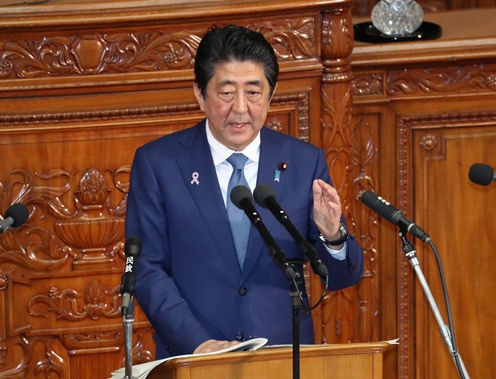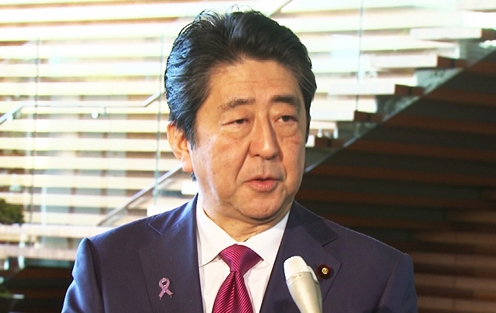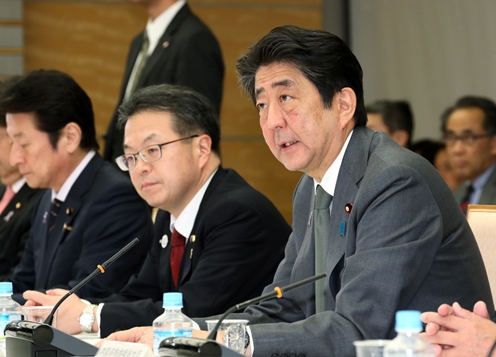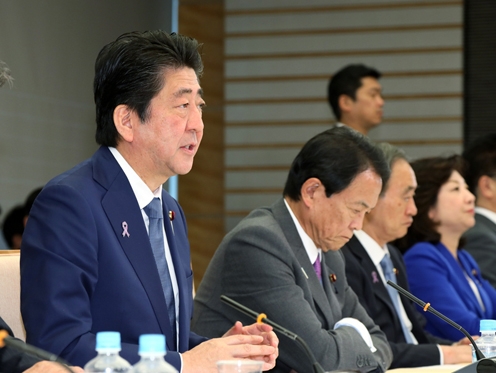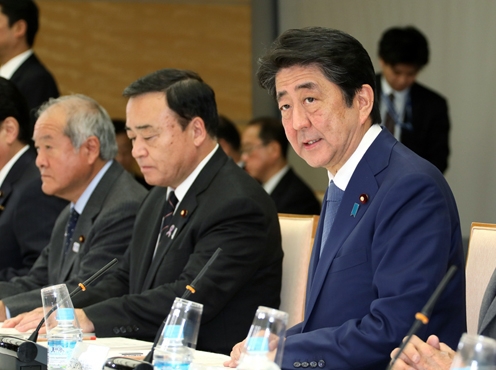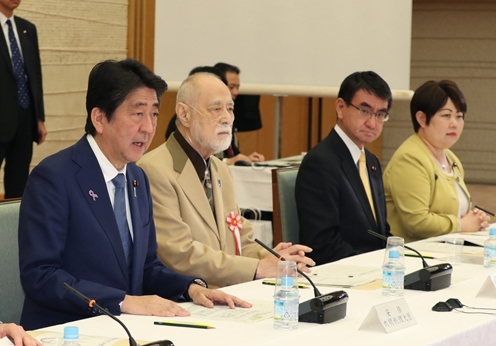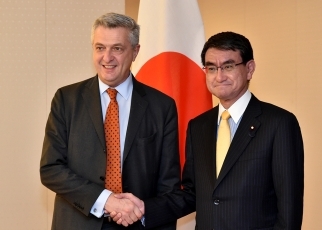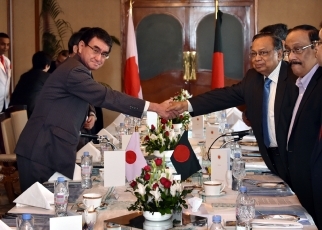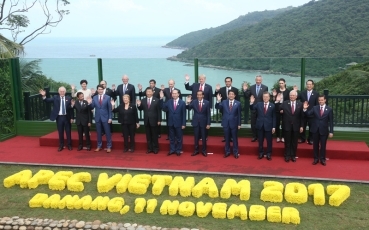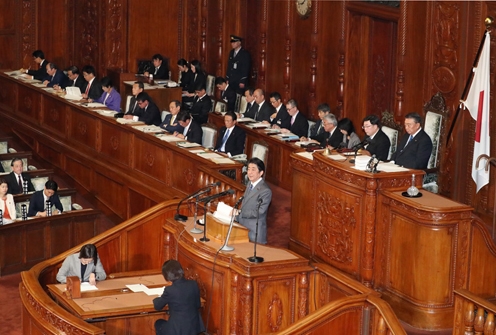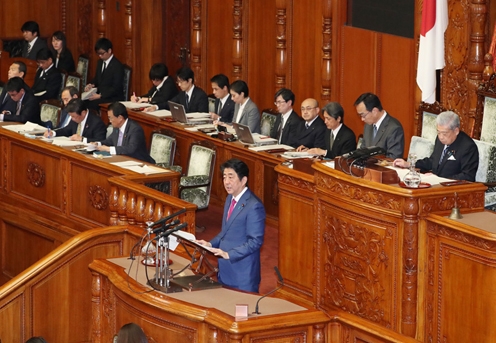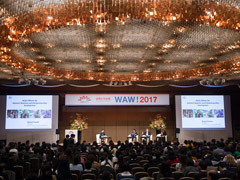Policy Speech by Prime Minister Shinzo Abe to the 195th Session of the Diet
Cabinet Secretariat, Friday, November 17, 2017
On November 17, 2017, Prime Minister Shinzo Abe delivered a policy speech to the 195th Session of the Diet during the plenary sessions of the House of Representatives and the House of Councillors.
Policy Speech by Prime Minister Shinzo Abe to the 195th Session of the Diet
Cabinet Secretariat, Friday, November 17, 2017
1. Introduction
Japan now faces issues that should truly be called national crises -- the increasingly tense situation surrounding North Korea; a rapidly aging society and decreasing birthrate. Without the confidence of the public, overcoming these national crises will be impossible.
Having been designated by both chambers of the Diet based on the results of the general election just held, I have come to continue to shoulder the weighty responsibilities of the prime minister.
“Execute your policies single-mindedly on a stable political foundation.”
That is the will of the public that was shown through the general election.
One by one we will transition into action the policies we pledged and deliver results. Together with the members of the ruling coalition in the Liberal Democratic Party and Komeito here in the Diet, I pledge to the Japanese people that we will live up to the public’s trust by devoting ourselves completely to this.
It is policies that are able to carve out the future of Japan. And, it is policy execution that can do so.
My fellow honorable members of the Diet, during this Diet session, let us pit our respective policies against each other industriously and hold constructive debates, and together advance policies that will benefit the Japanese people.
2. Responses to North Korean issues
It is no exaggeration to say that the security environment now surrounding Japan is the most severe in post-war history. I will continue to press ahead with active diplomacy backed by public trust.
The repeated launches of missiles flying over Japan and the conducting of nuclear tests by North Korea cannot be tolerated.
The other day, President Donald J. Trump of the United States came to Japan, whereupon we showed the world the unshakeable bonds of the Japan-U.S. alliance.
President Trump, looking at photographs of abductees one by one with a sincere gaze, listened intently to the heartfelt appeals of the victims’ families. With the victims’ family members aging, my mission will not be complete until the day when the abductees again walk the ground of their hometowns and join their family members in an embrace.
We will resolve the North Korea nuclear and missile issues and the abduction issue. We must cause North Korea to change those policies. For that reason, Japan will, together with the international community, further intensify pressure on North Korea.
During the APEC Economic Leaders’ Meeting and the East Asia Summit that were held recently, I again confirmed close cooperation in addressing the North Korean issues with other national leaders, notably President Vladimir Putin of Russia and President Xi Jinping of China.
We will hold a Japan-China-Republic of Korea Trilateral Summit Meeting at an early date and further deepen the cooperation among our three nations.
As provocations by North Korea escalate, we will make preparations for any circumstances and take concrete actions under the robust Japan-U.S. alliance. We will fortify Japan’s missile defense systems and other elements of our defense capacity and do our utmost to defend the lives and peaceful daily lives of the Japanese people.
3. Overcoming the declining birthrate and aging society
(Productivity revolution)
Over the past five years, I have continually shot “arrows of reform” under Abenomics and employment has increased by 1.85 million people. This past spring, the employment rate for newly-graduating university students reached its highest level in history. Over the past two years, regular employment has increased by 790,000 and the ratio of active job openings to applicants for permanent positions now exceeds 1 for the first time since the survey began.
In order to firmly ensure this growth trajectory for the economy, now is the time to take assertive steps towards overcoming the decreasing birth rate coupled with the aging of our society, our most critical issue.
We will carry out a “productivity revolution” and a “human resources development revolution.” In December we will draw up a new economic policy package and expeditiously transition into executing it.
Through artificial intelligence, robots, and the Internet of Things (IoT), we will achieve innovations that dramatically boost productivity, driving a “productivity revolution” which has started happening across the world. Positioning the three years until fiscal year 2020 as a period of intensive investment towards the productivity revolution, we will vigorously stimulate capital investments and investments in human resources by companies, including small- and medium-sized enterprises and micro enterprises, which suffer from a shortage of workers.
Through bold reforms to the tax system, the budget, and regulations, we will mobilize all possible policies and measures to further intensify the power of four consecutive years of wage increases and ensure that we pull out from deflation.
(Human resources development revolution)
Boldly envisioning the characteristics of an economy and society that look ahead to an era in which the human lifespan spans a century, we will attempt to carry out major reforms to Japan’s socioeconomic system.
We will push forward in one stroke towards making preschool education effectively free. By fiscal year 2020, we will make kindergarten and nursery school expenses effectively free of charge for all children ages three to five. We will also make all expenses effectively free for children up to two years old from low-income households.
The determination of the Abe Cabinet in aiming to eliminate the wait for childcare is unshakeable. We will accelerate implementation of the Plan for Raising Children with Peace of Mind drawn up this past June and prepare childcare arrangements for 320,000 children by fiscal 2020.
Honorable Diet members, let us all work together to create a Japan in which anyone with ambition can advance to senior high school or technical junior college, vocational college or university, no matter how financially disadvantaged his or her family may be. We will make higher education effectively free for children for whom such assistance is truly necessary.
We will ensure opportunities for everyone, no matter their age, to brush up their skills and take on new challenges. We will radically expand recurrent education in order to make that a reality.
In order to meet such needs, we will press forward with reforms to universities, which will serve as the bases leading the “human resources development revolution.”
We will prepare nursing care arrangements for 500,000 people by early in the 2020s. Moving towards that major target, we will strengthen our efforts to secure nursing care workers. We will press forward with further improvements in treatment in order to eradicate the wage disparity with other industries.
We will eliminate areas of great unease facing the working generation, including child rearing and nursing care worries, and dramatically reform Japan’s social security system to become a system oriented to all generations under which both elderly and young citizens are able to enjoy peace of mind. We will create a society where all women shine, and “a society in which all citizens are dynamically engaged,” with each person able to feel a purpose in life, whether that person is old or young, or someone with a disability or an intractable illness.
With the consumption tax rate scheduled to be raised in October 2019, we will review the way in which we use consumption tax revenues and boldly make investments that will assist families with small children and assist children. We will appropriate financial resources generated through the consumption tax in a well-balanced manner to make investments that will support families with small children and stabilize social security. By doing so, we will be certain to achieve fiscal soundness.
Honorable fellow members of the Diet, let us together trace out a course by which Japan overcomes its aging society and shrinking birthrate and enjoys robust growth.
4. Incorporating growth from around the world
Shinkansen (bullet trains), the pride of Japan, will run across the vast land of India. This September, construction began on a high-speed rail line there.
My administration’s more than 200 endeavors at the highest levels to expand our markets overseas have borne fruit, with the value of our infrastructure exports increasing by 10 trillion yen over the past five years. By expanding throughout the world Japan’s high level of technology and know-how, we will increase our opportunities to grow significantly even in the midst of a decreasing birthrate and graying society.
We will expand economic zones based on free and fair rules globally. We will aim at the early entry into force of the Trans-Pacific Partnership Agreement being negotiated by 11 nations. We will also lead negotiations on the Regional Comprehensive Economic Partnership so that it becomes an ambitious agreement.
As the result of over four years of tenacious negotiations, we have reached agreement with the EU on the fundamental elements of our Economic Partnership Agreement (EPA). This EPA will create an enormous economic zone with a population of 600 million people that accounts for 30 percent of global GDP. It is a “new engine” under Abenomics.
We will take adequate measures so as to reliably address the unease and worries of Japan’s farmers and enable them to engage in reproduction with peace of mind. We will make full use of our rice fields and thoroughly preserve Japan’s rich hilly and mountainous areas and our beautiful local areas.
Our attempts to develop markets around the world constitute a significant opportunity for Japan’s high-quality agricultural, forestry, and marine products that are produced through investments of time and effort. Our exports of agricultural, forestry, and marine products have been expanding at a pace by which we have broken the record high for five consecutive years, including this year. The number of young workers in their 40s or younger that are newly employed in agriculture has surpassed 20,000 for three consecutive years for the first time since the survey on this began.
The reform of agricultural policy will be a trump card in vitalizing local economies. Within 2017, we will compile plans for radical reforms to the forestry and marine products industries with a view to boosting productivity.
We will expand reforms across the entirety of the agricultural, forestry, and marine products industries and carve out a “new era for the agricultural, forestry, and marine products industries,” in which young people can have dreams and hopes for the future.
5. Recovery and reconstruction from disasters
In Tohoku’s disaster-stricken areas, more than 80 percent of farmland is able to be planted and all fishing ports have been restored. In Fukushima, which suffered significant harm from the nuclear accident, evacuation orders have been lifted in almost all areas except for zones that have been specified as “difficult to return,” and interim storage facilities have been in operation since last month. We will press forward in transporting to these facilities soil collected through decontamination, and in 2020 we will remove all temporary storage sites from locations close to where people spend their daily lives.
In order to further accelerate the reconstruction of disaster-affected areas, we will continue to vigorously support the restoration of livelihoods and the restoration of people’s psychological well-being.
This year Japan again met with natural disasters one after the other in various locations around the country. We will review the practical application of the system for designating regions that have suffered extreme damage to enable us to designate such regions promptly. We will thoroughly undertake efforts for disaster preparedness and mitigation and advance measures to make the nation’s infrastructure more resilient.
6. Conclusion
It was three years and three months that the Liberal Democratic Party and Komeito spent as opposition parties.
We started by reflecting intensely on, and listening to the voices of the public regarding, the reasons we had lost control of the government. We held small gatherings in locations all around the country and thoroughly built up our policies by giving due regard to the stern comments we received from the public.
And, we have put forth every effort over these past five years towards carrying out those policies.
What should we do in the present day as we responsibly take a focused look at Japan’s future? Let us transcend the framework of ruling and opposition parties to hold constructive policy debates and move forward together.
Let us make efforts to put forth the wisdom each side holds and together generate responses to difficult issues. It is my firm conviction that as we engage in such efforts our discussions on constitutional reform will be able to move forward.
The task before us is nothing other than to execute, execute, and execute policies. Let us squarely confront the difficult issues facing Japan and together carve out Japan’s future.
Thank you for your kind attention.
Press Occasion on the Re-Designation by the United States of North Korea as a State Sponsor of Terrorism
Cabinet Secretariat, Tuesday, November 21, 2017
[Provisional Translation]
On November 21, 2017, Prime Minister Shinzo Abe held a press occasion at the Prime Minister's Office.
In regard to the re-designation by the United States of North Korea as a state sponsor of terrorism, the Prime Minister said,
“Japan welcomes and supports the re-designation by the United States of North Korea as a state sponsor of terrorism, as a means of strengthening pressure on North Korea.”
Joint Meeting of the Council on Economic and Fiscal Policy and Council for Science, Technology and Innovation
Cabinet Secretariat, Thursday, November 16, 2017
[Provisional Translation]
On November 16, 2017, Prime Minister Shinzo Abe jointly held the 15th meeting in FY2017 of the Council on Economic and Fiscal Policy and the 32nd meeting of the Council for Science, Technology and Innovation at the Prime Minister’s Office.
During the meeting, there were intensive deliberations over monetary policy, commodity prices, and other issues, followed by discussions on science, technology and innovation that could contribute to the productivity revolution, as well as on the administrative and fiscal affairs of local governments, and social infrastructure development.
Based on the discussion, the Prime Minister said,
“First, with regard to science, technology and innovation, private sector members shared their views about how government research and development should be carried out with a clear exit strategy and the need to simplify procedures and ensure rigorous evaluation and management as well as the importance of enhancing university reforms such as by implementing governance reforms and promoting the active roles of young researchers. Boosting innovation is essential to sustainable growth of Japan’s economy. I ask that the relevant ministers, including Minister Matsuyama and Minister Hayashi, swiftly formulate specific measures based on today’s discussions and work toward implementing them.
Second, with regard to the administrative and fiscal situations of local governments, we heard from private sector members that supports should be reinforced for local governments that have successfully made their spending efficient and that each local government should swiftly formulate a management soundness policy for the third sector. I would like Minster Noda to accelerate reforms for achieving a sustainable fiscal structure at local governments based on today’s discussion.
Third, with regard to social infrastructure development, private sector members shared their views that utilizing PPP and PFI schemes for water supply, sewerage projects, and others should be expanded, and that relevant ministries and agencies should work together on the use of regional social infrastructure, in response to the declining population. I also believe developing a logistics network that helps to greatly increase productivity is extremely important. I ask that relevant ministers, including Minister Ishii, reinforce initiatives for raising the quality of social infrastructure.”
Council on Investments for the Future
Cabinet Secretariat, Friday, November 17, 2017
On November 17, 2017, Prime Minister Shinzo Abe held the 12th meeting of the Council on Investments for the Future at the Prime Minister’s Office.
At the meeting, there was discussion on the productivity revolution.
Based on the discussion, the Prime Minister said,
“We must implement bolder policies than ever before in order to encourage strong investments by the private sector in human resources and facilities toward the realization of a productivity revolution by the grand goal of 2020.
We will establish an environment in which companies that are proactively raising wages and making capital investments can fully compete in the global marketplace. In particular, we will provide an environment in which companies undertaking bold endeavors in innovative technology and business are able to resolutely overcome the international competition. On the other hand, through the use of corporate governance reforms and various policy tools, we will encourage decisive management decisions to be made by companies that are unmotivated in raising wages and making capital investments despite the highest level of corporate profits ever.
I would like to consider bold, focused policies, including on the tax system. In particular, amidst the large improvement in the employment situation, an issue for the Government is improving productivity at small- and medium sized enterprises (SMEs) facing personnel shortages. Through to the present, the Abe Cabinet has been supporting aggressive investments by SMEs, including by halving fixed asset taxes. Additionally, I want to create bold support measures that include unprecedented tax systems, the supplementary budget, and other matters, in order to support owners of SMEs who undertake endeavors like investments despite difficult business environments such as being in the red. I want to spread the wave of economic recovery to every corner of Japan by building management environments in which wage increases are possible even at SMEs.
The key to the productivity revolution will be realizing innovation. We are advancing grand reforms for systems that will create innovation, including governance reforms at universities, which are innovation hubs, and bold allocations of government resources to young researchers. The fourth industrial revolution is now giving rise to a series of new businesses all around the world. We must advance daring regulatory and structural reforms that will keep us ahead of modern trends. We are promoting structural reforms in line with the Society 5.0 era, including the opening of frequency bands through technological innovation, the construction of shared platforms for the integration of big data, and the opening of public data. Alongside regulatory reforms in individual fields, we will create regulatory sandbox frameworks in order to connect businesses with unprecedented, innovative ideas. To that end, I would like everyone to support preparations toward the submission of bills to the next ordinary session of the Diet. By promoting reforms, I want to create a Japan that draws people who want to start businesses from all over the world.
Japan will be the first in the world to realize the productivity revolution. I want to implement unprecedented, bold policies on tax, budget, and regulatory reform to make that possible. I request that each minister advance the realization of measures toward the decision on the economic policy package next month under this overarching policy.”
Council on Overcoming Population Decline and Vitalizing Local Economy
Cabinet Secretariat, Friday, November 17, 2017
On November 17, 2017, Prime Minister Shinzo Abe held the 13th meeting of the Council on Overcoming Population Decline and Vitalizing Local Economy in Japan at the Prime Minister's Office.
At the meeting, there was discussion regarding the revision of the comprehensive strategy for overcoming population decline and vitalizing local economy.
The Prime Minister said in his opening address,
“Over the past 15 years, the number of young people in the regions has declined by 5 million people. It has been three years since we began regional revitalization, but the reality is that we still have not put a halt to that trend.
Young people are truly the source of regional vitality. The Government as a whole will work on the revitalization of dynamic regions where young people can feel that they can live full of dreams and hopes for their future.
We will promote the development of splendid regional universities that will draw students from not just around Japan but around the world, for studies in every field including advanced science, tourism, and agriculture.
We will strongly support endeavors by young people with fresh ideas to start new businesses leveraging vitality in the regions.
We must advance regional revitalization that makes young people feel that the regions hold opportunities as places to study and work.
I want each ministry to come together, centered on Minister Kajiyama, for a consideration of these issues, toward the revision of the comprehensive strategy at the end of the year. This meeting always features a lively discussion, and I look forward to one today as well.”
“Beauty of Japan” Comprehensive Project Advisory Panel and Japonisme 2018 Comprehensive Promotion Council
Cabinet Secretariat, Friday, November 17, 2017
On November 17, 2017, Prime Minister Shinzo Abe held the fifth meeting of the “Beauty of Japan” Comprehensive Project Advisory Panel and the second meeting of the Japonisme 2018 Comprehensive Promotion Council at the Prime Minister's Office.
At the meeting, there was discussion on the status of considerations for Japonisme 2018 and other matters.
The Prime Minister said in his opening address,
“I would like to express my gratitude to everyone for attending this Japonisme 2018 Comprehensive Promotion Council meeting today despite your busy schedules.
The Japan Exposition idea born out of the ‘Beauty of Japan’ Comprehensive Project Advisory Panel will at last come to fruition on a grand scale next year as Japonisme 2018, which is to be held in France, based on the advice offered by all of the experts here, and under the concept of leveraging the power of Japan’s renowned culture for diplomacy.
This will be the first cultural project of its kind to be held on such a large scale by the Japanese Government during this century. If circumstances permit, I would like to attend the opening ceremony in Paris together with President Macron of France in July. I want to build up momentum for the opportunity presented by Japonisme 2018.
Under Japonisme 2018, which will take place over an approximately eight month period from July 2018 to February 2019, a variety of projects are being prepared that will give multifaceted introductions to Japan’s arts and culture in each area of France, centering on Paris.
Japonisme 2018 will have an exciting lineup designed to thoroughly convey the charms of each region of Japan. In terms of Japan’s traditional culture, the project will showcase everything from the masterpieces of Ito Jakuchu and the Rinpa School, to Kabuki and Noh theater. In terms of modern culture, the project will highlight everything from experimental digital art using the latest technology to contemporary theater that is shaping modern society. Japanese food, regional festivals, and other subjects will also be featured. Altogether, Japonisme 2018 will thoroughly communicate the charms of Japanese culture.
Going forward, I want to maximize the promotional impact of this project to the greatest possible extent by working on PR activities for this within Japan and abroad and inspiring people all around the world to take an interest in Japan, toward the Tokyo 2020 Olympic and Paralympic Games.
There is already only one year left until Japonisme 2018. I instruct the relevant ministries and agencies to see to it that the Government works as one to exert every effort for the success of this project. I also would like to ask for the further cooperation of the private sectors in Japan and France. I ask for the frank opinions of the members of the ‘Beauty of Japan’ Comprehensive Project Advisory Panel and Japonisme 2018 Comprehensive Promotion Council toward the success of Japonisme 2018.”
Foreign Minister Kono Receives a Courtesy Call from the United Nations High Commissioner for Refugees (UNHCR)
Foreign Affairs, Friday, November 17, 2017
On November 17, commencing at 2:40 p.m. for approximately 20 minutes, Mr. Taro Kono, Minister for Foreign Affairs, received a courtesy call from Mr. Filippo Grandi, The United Nations High Commissioner for Refugees (UNHCR), during his visit to Japan. The overview of the courtesy call is as follows:
1. At the outset, Minister Kono welcomed High Commissioner Grandi’s visit to Japan. He noted that as the number of refugees and internally-displaced persons hit the highest since World War II, the role of the UNHCR had never been more important, and that Japan wished to further expand its cooperation with the UNHCR. In response, High Commissioner Grandi stated that the UNHCR also hoped to continue working toghether with Japan.
2. Minister Kono also stated that the Government of Japan would newly allocate 3.6 million US dollars of its initial budget to the UNHCR, to assist the activities of the UNHCR in Bangladesh. In response, High Commissioner Grandi expressed appreciation for Japan’s assistance.
[Reference 1] Mr. Filippo Grandi, the United Nations High Commissioner for Refugees (UNHCR)
High Commissioner Grandi has been serving in his current position since January 2016, after serving as head of the UNHCR’s Afghanistan office, Deputy Special Representative (responsible for political affairs) of the Secretary-General at the UN Assistance Mission in Afghanistan (UNAMA), and Commissioner-General of the UN Relief and Works Agency for Palestine Refugees in the Near East (UNRWA). He also used to serve as Special Assistant to former UNHCR, Ms. Sadako Ogata. This is his third visit to Japan as UNHCR.
[Reference 2] The Office of the United Nations High Commissioner for Refugees (UNHCR)
The UNHCR is a United Nations organization that undertakes humanitarian assistance with the goal of protecting refugees and permanently resolving the refugee issue.
The UNHCR’s activities include granting international protection, providing lifestyle assistance and promoting voluntary repatriation, local settlement and resettlement for refugees and internally-displaced persons, and promoting the conclusion of treaties for protecting refugees and stateless persons.
Japan-Bangladesh Foreign Ministers’ Meeting
Foreign Affairs, Sunday, November 19, 2017
On Sunday, November 19, from 8 a.m. (local time) for approximately 45 minutes, Mr. Taro Kono, Minister for Foreign Affairs, on his visit to the People’s Republic of Bangladesh, held a meeting over breakfast with H.E. Mr. Abul Hassan Mahmood Ali, Foreign Minister of Bangladesh. The overview of the meeting is as follows.
1 At the beginning, Minister Ali welcomed the visit of Minister Kono to Bangladesh, expressed the view that the two countries enjoy amicable relationship that encompasses people-to-people exchanges, including at the summit level, as well as cultural exchanges, and explained that in particular, the people of Bangladesh feel deep gratitude for the consistent support extended by Japan, including 600 billion yen of assistance. In addition, Minister Ali showed gratitude to the Government of Japan for demonstrating a clear intention to continue economic cooperation with Bangladesh even after the terrorist attack in Dhaka, and explained that Bangladesh will continue to take all possible measures to ensure the safety of Japanese citizens.
In response, Minister Kono stated that a large number of precious lives were lost in the Dhaka terrorist attack, but as a good development partner, Japan will continue to cooperate on Bangladesh’s development on all fronts so that the country can attain “newly industrialized economy” status by 2021. Minister Kono explained that he intends to further deepen the bilateral relationship under the Japan-Bangladesh Comprehensive Partnership.
2 Minister Kono highly appreciated that the Government of Bangladesh is accepting the displaced persons who are flowing into Bangladesh as a result of the attacks in Rakhine State, that it is responding with the utmost efforts to the humanitarian perspective, and that it is making efforts to resolve the current crisis through dialogue with the Government of Myanmar. In addition, Minister Kono explained Japan’s position of solidly supporting the Government of Bangladesh’s efforts toward a permanent solution, including the repatriation of displaced persons, and that in addition to the emergency assistance Japan has provided thus far, it has decided to provide a total of 18.6 million U.S. dollars of assistance (note) through international organizations as support for areas that are a high priority to the growing number of displaced persons, such as food.
(note) 15 million U.S. dollars of newly-decided Emergency Grant Aid (United Nations World Food Programme) and a new allocation of 3.6 million U.S. dollars from the UNHCR (UN High Commissioner for Refugees)’s initial budget expenditure.
3 In response, Minister Ali explained Bangladesh’s humanitarian efforts for the displaced persons and its ongoing dialogue with the Government of Myanmar aimed at a permanent solution, along with expressing gratitude for the support extended by the Government of Japan, including the support of the UN Security Council (UNSC) Presidential Statement. The two sides shared the view that Japan and Bangladesh will continue to collaborate closely.
4 Minister Kono explained Japan’s Free and Open Indo-Pacific Strategy, and Minister Ali explained that Bangladesh concurs with principles such as freedom of navigation and the rule of law in this region and is happy to be part of Indo-Pacific concept.
5 Minister Kono explained the importance of maximizing pressure on North Korea, including by implementing UNSC resolutions, and of promptly resolving the abductions issue. Minister Ali stated that Bangladesh strongly supports Japan’s position on North Korea.
6 Minister Kono expressed the view that the UN system is not based on the international community’s current circumstances and reform is needed. Minister Ali stated that Bangladesh supports Japan becoming a permanent member of the UNSC, and the two sides shared the view that Japan and Bangladesh will continue coordinating to realize the UNSC reform.
7 Minister Kono welcomed Minister Ali to visit Japan, and Minister Ali expressed interest in visiting Japan as early as next year. The two sides decided that the visit will be coordinated in the future.
Emergency Grant Aid for persons newly displaced in the People’s Republic of Bangladesh
Foreign Affairs, Friday, November 17, 2017
1. On November 17, the Government of Japan decided to extend Emergency Grant Aid of 15 million US dollars for the newly displaced people in Bangladesh affected by the attacks carried out against the security forces on August 25 and subsequent destabilization of the situation in the northern part of Rakhine State, Republic of the Union of Myanmar.
2. This Emergency Grant Aid is to provide humanitarian assistance, through the United Nations World Food Programme, in the areas of provision of food, logistics and the rehabilitation of road in Bangladesh in order to support the displaced people living in severe humanitarian situation.
3. With extending this assistance, it is expected to improve the malnutrition of approximately 100,000 people by distributing food for 5 months and to enhance logistics in order to effectively distribute food to about 800,000 people
Traffic Incident in Naha, Okinawa
Foreign Affairs, Sunday, November 19, 2017
On November 19, around 5:25 a.m., as a U.S. Marine member, driving under the influence of alcohol, collided with a vehicle driven by a Japanese man, this Japanese was killed by this incident. The Ministry of Foreign Affairs, Japan, expressed its deep regret over this incident and requested that discipline would be strengthened and that measures would be taken to prevent recurrence to Mr. Joseph YOUNG, Deputy Chief of Mission, U.S. Embassy Tokyo, as well as Maj.Gen. Charles G. CHIAROTTI, Deputy Commander of the U.S. forces, Japan. In response to this, the U.S. side expressed its condolence and apology.
In the afternoon on the same day, based on the direction from Foreign Minister Taro KONO, currently in visit to Bangladesh, Mr. Shinsuke SUGIYAMA, Vice-Minister for Foreign Affairs, conveyed the same message to H.E. Mr. William HAGERTY, U.S. Ambassador to Japan. In response to this, Ambassador Hagerty expressed condolence and apology saying that he would like to convey the feeling of condolence to the victim killed in this tragic incident as well as his family. Furthermore, Ambassador Hagerty told that the U.S. side would make utmost efforts for cooperation on the investigation and the recurrence prevention.
Cabinet Decision on the Bill of the Cabinet Order for Partial Revision of the Export Trade Control Order
METI, Friday, November 17, 2017
For the purposes of preventing the proliferation of weapons of mass destruction, preventing the excess accumulation of conventional weapons, and executing treaties and other international agreements, the Ministry of Economy, Trade and Industry (METI) controls exports of goods under the Foreign Exchange and Foreign Trade Act and the Export Trade Control Order (hereinafter referred to as the “order”, which falls under the Foreign Exchange and Foreign Trade Act).
METI hereby announces that on November 17, 2017, the Cabinet approved the Bill of the Cabinet Order for the Partial Revision of the Export Trade Control Order concerning [ⅰ] revision of goods in the export regulatory list based on the agreements concluded at the International Export Control Regimes held in 2016 and [ⅱ] expansion of the scopes of the special provisions from the viewpoint of institutional harmonization with international treaties.
1. Outline of the revision
The order is to be revised concerning goods in the regulatory list so that the government of Japan can ensure domestic implementation of the agreements and other rules concluded at the International Export Control Regimes (related to Appended Table 1 of the order).
From the viewpoint of appropriate enforcement of the Basel Convention, the order is to be revised to stipulate a provision that no export approval is required in returning to the originating countries temporary-landed specified hazardous wastes and other goods which have been illegally imported. (related to Appended Table 2 of the order)
The details of the revision are as follows:
Related to Appended Table 1 of the order
Addition of parts of plasma melting furnaces and electron-beam melting furnaces (Partial revision of Appended Table 1, column 2)
Removal of semi-finished or primary ceramic products (Partial revision of Appended Table 1, column 5)
Addition of encoder parts (Partial revision of Appended Table 1, column 7)
Related to Appended Table 2 of the order
Addition of specified hazardous wastes and other goods subject to special provisions for temporary landed goods (Partial revision of Article 4(2)(i))
Note:In line with the revisions in the order, METI will also revise the related ordinances, public notices and other regulations.
2. Future schedule
Promulgation:
November 22 (Wed.), 2017
Enforcement:
November 22 (Wed.), 2017 (Provisions related to Appended Table 2)
January 22 (Mon.), 2018 (Provisions related to Appended Table 1)
Release date
November 17, 2017
Division in Charge
Information on Appended Table 1 of the order:
Security Export Control Administration Division
Information on Appended Table 2 of the order:
Trade Control Policy Division
Prime Minister Shinzo Abe Attended APEC and ASEAN-related Summit Meetings (Nov. 9 to 15)
Foreign Affairs, Tuesday, November 14, 2017
APEC Economic Leaders’ Meeting Declaration
Annex A : APEC Action Agenda on Advancing Economic, Financial and Social Inclusion in the APEC Region
Annex B : APEC Framework on Human Resources Development in the Digital AGE
Plenary Session of the House of Representatives
Cabinet Secretariat, Monday, November 20, 2017
On November 20, 2017, Prime Minister Shinzo Abe attended the plenary session of the House of Representatives.
Plenary Sessions of the House of Councillors and the House of Representatives
Cabinet Secretariat, Tuesday, November 21, 2017
On November 21, 2017, Prime Minister Shinzo Abe attended the plenary session of the House of Councillors in the morning, and the plenary session of the House of Representatives in the afternoon.
JICA President Speaks at 2017 World Assembly for Women, Emphasizes Support for Woman Entrepreneurs in Developing Countries
JICA, Monday, November 20, 2017
Political and business leaders and experts from around the world gathered for the World Assembly for Women in Tokyo from Nov. 1 to 3.
The Government of Japan has been holding the conference, which is abbreviated as WAW!, every year since 2014 to communicate policies to encourage active roles for women. The theme of WAW! 2017 is "WAW! in a Changing World." Participants' lively discussions included a conversation on support for woman entrepreneurs, a subject getting international attention. Part of this support is the Women Entrepreneurs Finance Initiative*1 announced at the G20 Summit in July 2017.
On Nov. 1, following the opening remarks by Akie Abe, the Spouse of Japanese Prime Minister Shinzo Abe, and keynote addresses, JICA President Shinichi Kitaoka participated in a panel discussion called “Women and Entrepreneurship.” Kathy Matsui, Vice Chair and Chief Japan equity strategist at Goldman Sachs Japan Co., Ltd., served as the moderator of the panel. In addition to Mr. Kitaoka, panelists included Susi Pudjiastuti, Maritime Affairs & Fisheries Minister, Republic of Indonesia and Arancha González, Executive Director, International Trade Centre.
Mr. Kitaoka began by saying that though Japan lags the world on closing its gender gap, historically it is a country where women have played active roles. He went on to emphasize that women have the potential to create businesses suited to the new era. As examples of JICA supporting woman entrepreneurs in a developing country, he talked about encouraging small businesses owned by women in the Kyrgyz Republic and improving access to funding for women entrepreneurs in Ethiopia and ASEAN countries. Finally, he said JICA is determined to continue removing barriers to women demonstrating their potential and making social progress, and it is also committed to supporting entrepreneurship by women.
That morning, Mr. Kitaoka also met with Pramila Patten, the U.N. Special Representative of the Secretary-General on Sexual Violence in Conflict, who was in Japan to participate in WAW!. They discussed initiatives to abolish sexual violence in conflicts.
On Nov. 2, Japanese Minister of Foreign Affairs Taro Kono gave the overall conference opening remarks, in which he talked about assistance for human trafficking countermeasures in the Mekong Delta as representative of the Japanese government's initiatives in the fields of gender equality and the empowerment of women. This was followed by seven sessions, including a round table on "Women, Peace and Security." Closing remarks were made by Seiko Noda, Minister of Internal Affairs and Communications, Minister in charge of Promoting Women's Active Participation and Minister appointed by the Cabinet Office.
On Nov. 3, a WAW! special event was held by the World Bank and the government of Japan. In his opening address, Japanese Prime Minister Shinzo Abe introduced the case of entrepreneur Lim Porty. She started a business through a program administered by JICA to support entrepreneurs*2 and is working to solve the problem of poverty in rural areas of Cambodia. Ivanka Trump, Advisor to the U.S. President, gave a special speech emphasizing the importance of economically empowering women.
Based on the "Development Strategy for Gender Equality and Women’s Empowerment" of the Japanese Government, JICA will continue its comprehensive measures toward gender equality and the women’s empowerment.
*1 Abbreviated We-Fi. It was established at the World Bank. The Japanese government announced a US$50 million contribution.
*2 Offered at the Cambodia-Japan Cooperation Center.

























